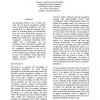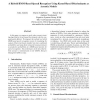239 search results - page 3 / 48 » Lithuanian Speech Recognition Using the English Recognizer |
ACL
2011
12 years 9 months ago
2011
Large vocabulary speech recognition systems fail to recognize words beyond their vocabulary, many of which are information rich terms, like named entities or foreign words. Hybrid...
COLING
2000
13 years 7 months ago
2000
Our principle objective was to reduce the error rate of speech recognition systems used by professional translators. Our work concentrated on Spanish-to-English translation. In a ...
ICASSP
2009
IEEE
14 years 15 days ago
2009
IEEE
In recognizing spontaneous speech, the performance of typical speech recognizers tends to be degraded by filled and silent pauses, which are hesitation phenomena frequently occur...
ICPR
2006
IEEE
14 years 6 months ago
2006
IEEE
In this paper we propose a novel order-recursive training algorithm for kernel-based discriminants which is computationally efficient. We integrate this method in a hybrid HMM-bas...
SPEECH
2010
13 years 15 days ago
2010
Despite years of speech recognition research, little is known about which words tend to be misrecognized and why. Previous work has shown that errors increase for infrequent words...


